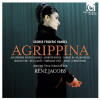Texte paru dans: / Appeared in:
*

GRAMOPHONE (01/2012)
Pour s'abonner /
Subscription information
Harmonia Mundi
HMC902088/90
Reviewer: Richard Wigmore
Jacobs turns to Handel’s early Venetian romp
Sensationally successful on its Venice premiere in January 1710, Agrippina may not be the most profound Handel opera but it is surely the most fun. Responding to Venetian taste, Handel and his (anonymous) librettist created a work with relatively few full-dress da capo arias but lots of short, dance numbers. There are no opera seria heroics in this fictionalised snapshot of sex and power politics in ancient Rome, centring on the machinations of the Machiavellian Agrippina to secure the throne for her son Nero. The two women in the cast, Agrippina and the sex kitten Poppea, hold all the cards, reducing one man after another to jelly. While the opera contains flashes of deeper emotion, especially where the devoted Ottone is involved, the overall tone is wryly satirical, sometimes — as in the Feydeauesque scene where Poppea hides two mooning lovers while admitting a third to her room — tipping over into farce. In the lavishly produced booklet René Jacobs puts his case for using an edition based on Handel’s autograph rather than following the familiar revised version (recorded by Gardiner) heard at the Venice premiere. The differences are most pronounced in Act 3: if the comic-dramatic pacing of the original is snappier, we lose three fine arias, including one for Juno who, in a last-minute stroke of irony, appears as a dea ex machina to bless the (short-lived) marriage of Otho and Poppea.
True to form, Jacobs directs a larger-than life performance of crackling theatrical energy, using most of the singers from the production he conducted in Berlin in 2009. The recitatives make the characters’ conspiracies, confrontations and lusts vividly immediate, abetted by facetious commentaries from the varied continuo group. Purists may throw up their hands, but dulli it ain’t. In the arias and the brief ensembles Jacobs conducts the crack Berlin period hand with his familiar mix of zest and wilfulness. His penchant for aggressive pounding accents and controversial tempo manipulations makes Gardiner sound decorous — no mean feat. More than once the hyperactive harpsichord continuo turns an aria into a jangle-fest. Yet Jacobs’s manic tendencies have their point in an opera where over-the-top absurdity rules; and he never short-changes the (rare) moments of stillness such as Otho’s Act 2 lament, with its grieving oboe obligato.
Although his distinctive countertenor is less smooth than Michael Chance’s on the Gardiner recording, Bejun Mehta sings this, and his dulcet aria ‘Vaghe fonte’, with intense involvement and eloquent phrasing. The comic double—act of Pallas and Narcissus, both hopelessly besotted by Agrippina, is played with uncaricatured relish by Neil Dates and Dominique Visse; and while slightly stretched by the subterranean notes, Marcos Fink nicely catches the mingled self satisfaction, lechery and bemusement of the Emperor Claudius.
Sunhae Im, a Jacob’s favourite, sings prettily enough. But her shallow soubrettish tone barely suggests Poppea’s sexual allure, as the richer-voiced Donna Brown does on Gardiner’s recording. The impressive American mezzo Jennifer Rivera tends to make the devious, thoroughly self-centred Nero more likeable than he should be, though she certainly has the coloratura technique for her final aria, a brilliant concerto grosso for voice and instruments (she is more dramatically credible in the clips from the Berlin stage production on the bonus DVD). Derek Lee Ragin, for Gardiner, less pleasant to listen to, perhaps, leaves you in no doubt that the boy Nero is a monster in the making.
No one could ever accuse Alexandrina Pendatchanska of under-characterisation. If her chesty plunges and occasional shrieks in alt (she can go berserk in da capos) are not always easy on the ear, she sings with flame toned, no-holds-barred intensity, feigned tenderness, too, where required. This is Agrippina’s opera; and Pendatchanska remains a commanding, neurotic presence throughout. Dellajones, on the Gardiner recording, gives a performance in similar mode, though without going to Pendatchanska’s extremes. Final choice between the two recordings boils down, as so often, to taste. Jacobs is undoubtedly the more viscerally exciting, though Gardiner’s more balanced and subtle direction may be easier to live with in the long term. On the whole I also prefer Gardiner’s cast. Avid Handelians should have both recordings, not least for the different texts they offer of Handel’s first operatic triumph.
Cliquez l'un ou l'autre
bouton pour découvrir bien d'autres critiques de CD
Click either button for many other reviews



